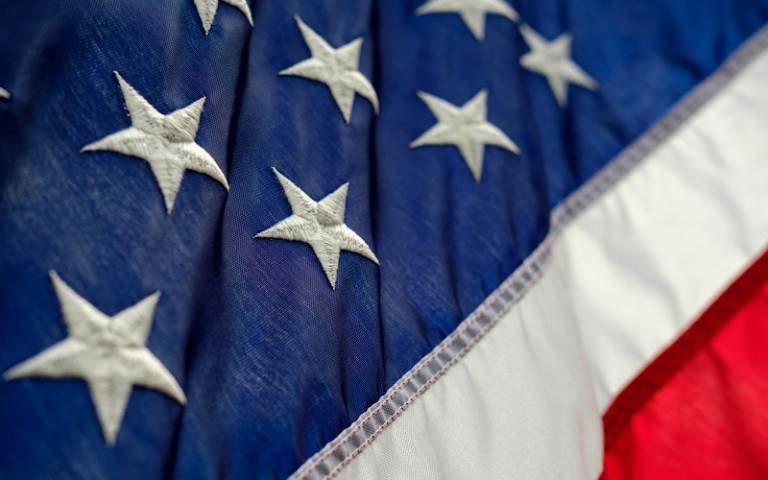Unalienable Rights and the Strange Case of American Exceptionalism
25 September 2020
Why does the United States remain an outlier on human rights? A commentary by Brian Dooley (GGI Visiting Scholar) and Tom Pegram (GGI Deputy Director).

While the Trump Administration’s attack on personnel working for the International Criminal Court (ICC) is the latest example of this presidency’s blanket hostility towards international organisations, it reflects a long legacy of American isolationism and antagonism towards multilateralism when it is perceived to not serve the “national interest”.
This exclusionary instinct has found full expression under Trump, who has withdrawn the US from the UN Human Rights Council, pulled out of the Paris Climate Accord, announced the US will stop funding for the World Health Organisation, and is pushing a harmful, alternative version to the current global understanding of human rights.
The State Department’s new Commission on Unalieanable Rights reframes long-accepted international human rights norms with a peculiar American twist. It promotes a hierarchy of rights, with religious freedom at the top, and others relegated further down a buffet menu from which countries can pick and choose.
A victory for Joe Biden in November’s US presidential election would no doubt reverse some of this dangerous erosion of internationally codified protections, but America’s brusque, often dismissive, attitude towards those more autonomous or egalitarian global governance structures isn’t only found within conservative circles.
Notwithstanding Democratic President Woodrow Wilson’s enthusiasm for the League of Nations a century ago, and Eleanor Roosevelt’s leading role in the formulation of the Universal Declaration of Human Rights in the late 1940s, American liberalism has long exhibited a streak strongly suspicious of anything smacking of global governance or, worse still, global government.
Indicative of this resistance, the US has for generations, and through successive Republican and Democrat administrations, been an outlier on human rights.
While more than 70 per cent of the world’s countries have abolished the death penalty, the US remains an anomaly among its close allies and democracies in continuing to execute people (22 prisoners were executed in 2019).
The US has long declined to enter key international human rights treaties. It is the only industrialised democracy not to ratify the 1979 Convention on the Elimination of All Forms of Discrimination Against Women (CEDAW), and remains the only country in the world which has failed to ratify the 1990 Convention of the Rights of the Child.
As for the ICC, the US was one of only seven countries – along with China, Iraq, Israel, Libya, Qatar, and Yemen – that voted against the Rome Statute setting up the ICC in 1998, and has refused to join it since.
For Washington beltway conservatives and liberals alike, multilateral cooperation with other countries is fine, up to a point. It’s an attitude perhaps akin to the first series of Star Trek, where intergalactic multilateralism is all very well as long as it is only humans from the US who are in command of the world venture to boldly go etc. And when American Captain Kirk is otherwise indisposed his duties fall to his deputy, the infallible alien Dr Spock.
Both conservative and liberal leaders in the US have long cleaved to this myth of American exceptionalism. In 2012, Republican presidential candidate Mitt Romney claimed that the US had a “unique blend of optimism, humility, and the utter confidence that when the world needs someone to do that the really big stuff, you need an American”.
In 2013, at his successful nomination hearing before the US Senate to become Secretary of State, Senator John Kerry claimed that “no nation is as committed to the cause of human rights as we are”. President Obama was also not shy in flying the flag for American exceptionalism, declaring that the US was “the one indispensable nation in world affairs”, continuing a long tradition of liberal justification for imperialist US foreign policy perhaps best captured by Madeleine Albright’s declaration in 1998 that “if we have to use force, it is because we are America; we are the indispensable nation. We stand tall and we see further than other countries into the future, and we see the danger here to all of us”.
This irritating rodomontade has baffled non-Americans for decades, but the current failure of the US government to protect its country from the COVID-19 pandemic has served as a sobering reality check for many if its citizens that splendid exceptionalism has its limits. To those who care to look, the virus offers a sharp reminder of the fragility of our highly connected global civilization and the deep implications of this fragility for internal political systems, including that of the US. Unfortunately, the exclusionary nationalist pandemic policies pursued by the Trump administration deny this reality, failing to acknowledge that the future security of US society will ultimately also hinge upon global cooperation. As Ian Goldin observes, “integrated and complex systems are only as strong their weakest links”.
If Trump loses in November and a Biden Administrations chooses to re-embrace the international fold that will no doubt be welcomed by many at a critical time for multilateral governance as crucial climate negotiations loom, but Washington will also need to wean itself off the intoxicating idea of its exceptional status in world affairs. Deepening international cooperation will depend upon recognition by US leadership that in an increasingly complex and multipolar world, it cannot dictate terms, neither can it go it alone.
 Close
Close


